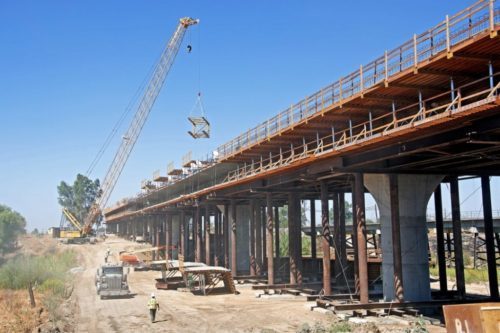Feds unexpectedly clear way for bullet train planning to advance

Three months after canceling a $929 million federal grant to the troubled California bullet train project, the Trump administration has unexpectedly given its go-ahead to the state to approve environmental documents that are needed to complete planning for the long-delayed project.
In May, after the funding was canceled, the relationship between the federal and state government seemed so bumpy that bullet train officials worried that Washington would try to sabotage the project by delaying approval of necessary paperwork. Instead, on Monday, the Federal Railroad Administration fulfilled a long-standing state request and moved environmental reviews of pending plans for the project’s full Los Angeles to San Francisco route from the federal to the state level. According to the Los Angeles Times, previously the agency had only approved segments from Bakersfield to Fresno and from Fresno to Merced.
“This action is an important milestone for the high-speed program,” said Brian Kelly, chief executive of the California High-Speed Rail Authority. “We’ve lost valuable time waiting with the FRA’s disengagement, so I am very thankful for this action and I am hopeful this step is the beginning of a more collaborative and cooperative relationship prospectively.”
But while state officials were relieved by the federal decision, funding obstacles still remain. The state only has about one-quarter of the $80 billion-plus it would take to link Los Angeles and San Francisco – and that’s for a plan that doesn’t use high-speed rail for segments from San Francisco to San Jose or from Los Angeles to its northern exurbs. This downscaling has led some longtime backers of the project, such as former state Sen. Quentin Kopp, to renounce it as a betrayal of promises made to state voters in 2008 when they approved $9.95 billion in bond seed money for what was then envisioned as a $43 billion statewide train system.
The lack of funding was behind Gov. Gavin Newsom’s February decision to pull back from predecessor Jerry Brown’s commitment to building a statewide system. Instead, Newsom said all $20.5 billion in available funding should be used to build a high-speed route between Bakersfield and Merced in the Central Valley.
Speaker wants changes to Newsom’s focus on Central Valley
But it now appears that even that scaled-back plan will face opposition from some key Democrats in the Legislature. On Thuesday, the Times reported that Democratic Assembly members from the Los Angeles and Bay areas – including Speaker Anthony Rendon – have for weeks discussed shifting the state’s rail focus. They hope to take up to $6 billion that Newsom wants to use in the Central Valley to improve rail service from Pasadena to Anaheim and commuter rail in and out of San Francisco. They believe a shorter, scaled-down version of the Central Valley route is viable with funding in the $14 billion range.
“I like the concept,” Rendon told the Times. “Any project that doesn’t have a significant amount of service to the largest areas in the state doesn’t make much sense.”
The prospect of taking state bullet train money for the Los Angeles area was first raised publicly in April by several members of board of the Los Angeles County Metropolitan Transportation Authority.
Any reduction in the scope of the Central Valley route proposed by Newsom is likely to face bitter opposition from the area’s politicians, who see the bullet train as crucial to improving the economy in one of the state’s poorest regions. They were enthusiastic about Newsom’s comments during last year’s campaign that a bullet train would be ideal to connect Silicon Valley workers with relatively inexpensive housing in the Central Valley.
Chris Reed
Chris Reed is a regular contributor to Cal Watchdog. Reed is an editorial writer for U-T San Diego. Before joining the U-T in July 2005, he was the opinion-page columns editor and wrote the featured weekly Unspin column for The Orange County Register. Reed was on the national board of the Association of Opinion Page Editors from 2003-2005. From 2000 to 2005, Reed made more than 100 appearances as a featured news analyst on Los Angeles-area National Public Radio affiliate KPCC-FM. From 1990 to 1998, Reed was an editor, metro columnist and film critic at the Inland Valley Daily Bulletin in Ontario. Reed has a political science degree from the University of Hawaii (Hilo campus), where he edited the student newspaper, the Vulcan News, his senior year. He is on Twitter: @chrisreed99.
Related Articles
6 Reps sign on to union giveaway
Despite new attention on excessively costly pension giveaways and on disability abuses by state employees, the Assembly is pushing forward
Jobs train 3:10 to Yuma
Sept. 10, 2012 By John Seiler Yesterday Katy Grimes put up a blog, “Editorial cheerleads for Brown.” One of the
Santa Ana: No link between pay, performance
A Voice of OC story details the extraordinary pay that the city of Santa Ana lavishes on its top managers:



